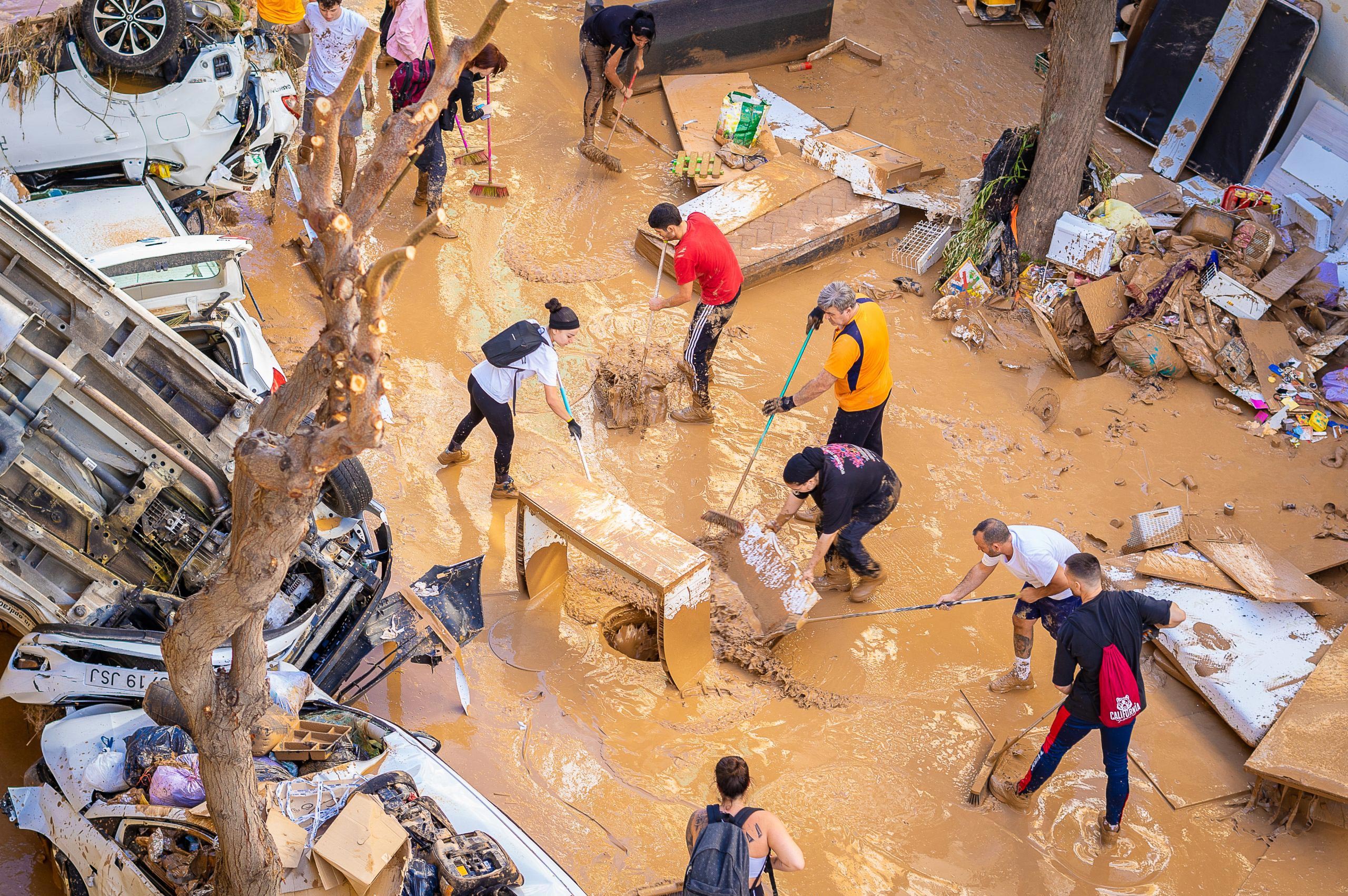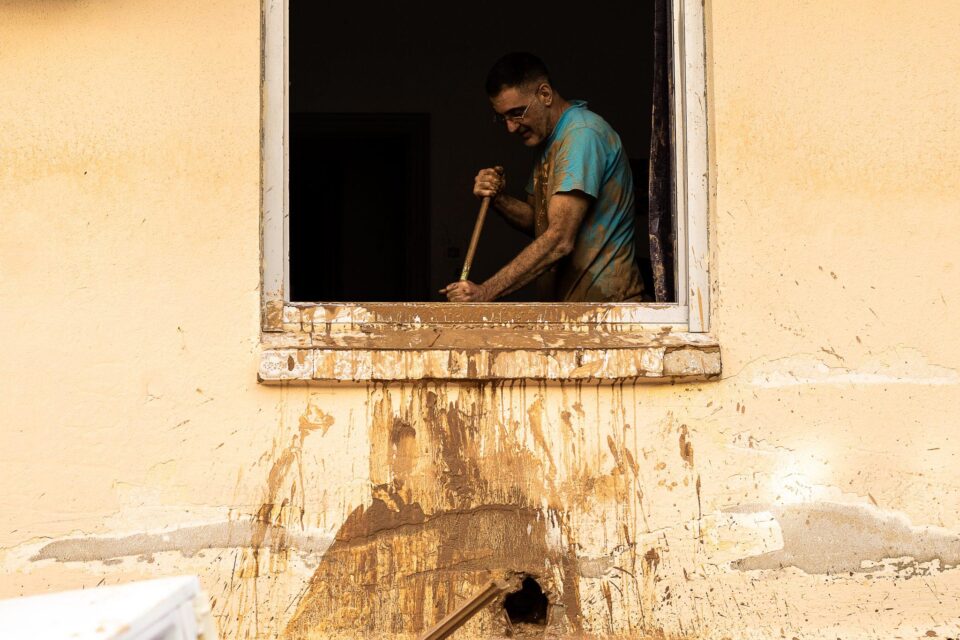At ODG, we have investigated the opacity and arbitrariness in the distribution of public funds allocated to recovery after the floods that devastated Valencia’s “Horta Sud”. Added to the tragic loss of life and the immesurable impact, disaster capitalism prevails once again: protecting large companies over people and the territory
* The DANA (Depresión Aislada en Niveles Altos, lit. Isolated Depression at High Levels, also known as a “cut-off low”) is a weather event that led to the catastrophic floods of October 2024 in Valencia.
On 29 October 2024, a flash flood claimed the lives of 229 residents of Valencia’s “Horta Sud” district and changed the lives of thousands of people forever. The risks posed by this cold drop had been detected days earlier by the AEMET. The lack of action on the part of the public administration exacerbated this danger, to the point of leaving hundreds of people going about their daily lives with no escape route: they did not receive the warning that should have been issued by the Valencian Regional Government. The most impoverished areas were the most affected and hardest hit by the floods.
What has happened during the year since the tragedy? Who has been able to access the financial resources allocated for recovery after the emergency? Has normality been restored to the streets of Algemesí, Benetússer, Paiporta, Alfafar, Picanya, Massanassa, Catarroja…? We have investigated the funds allocated to repair the damage caused by the DANA and to rebuild the towns covered with mud. The results of this investigation are presented in the Sota Focus report in La Directa 593, written by Ester Fayos and Eloi Latorre. According to the article, while the devastation in homes, businesses, and public spaces in the poorest neighbourhoods remains, large companies and establishments have resumed operations with the support of direct aid, guarantees, and public loans.
See the English version here:
“Life after DANA”, report by Ester Fayos, in collaboration with ODG
“Reconstruction contracts: plenty of urgency and little transparency”, report by Eloi Latorre, in collaboration with ODG.
The Spanish government made €16.6 billion available, and the Valencian Regional Government set aside €772.5 billion. This emergency recovery budget is to be distributed among individuals, self-employed workers and affected businesses. Of the Spanish allocation, as of last July, Pedro Sánchez’s government had paid out almost €6 billion, 37% of the total. Carlos Mazón’s government had distributed more than €283 million by August, 36% of the allocation. So far, it is large companies rather than the local population that have received a direct, rapid and almost unconditional flow of money.
This is like that under the assumption that to ensure the well-being of the population we need to keep the capitalist wheel turning and growth from stagnating. It is not questioned that large companies are bailed out, or that they should be subject to any obligations, such as guaranteeing jobs or promoting reconstruction adapted to climate change, points out Júlia Martí, ODG researcher in ecofeminism and the defence of the commons. Together with Marta Pérez Fargas, the political coordinator of ODG, they have traced all asignments for construction works and services by the authorities linked to the impacts of this episode of extreme weather.
Specifically, ODG has investigated emergency contracts, which were activated immediately after the rains, but which have not always been allocated to basic life-sustaining needs. These are services that can be assigned with just a phone call, without the need to sign papers or tender, and the company can start working immediately. Due to the lack of information, especially from the Valencian Regional Government, it is very difficult to know the terms of the contract and to verify whether it has been carried out as agreed. It is therefore almost impossible to audit either the contracted company or the contracting authority.
Rut Moyano, member of the Local Emergency and Reconstruction Committee (CLER) of Benetússer, talks about the impact of the DANA on the population in episode 30 of the Desenredades podcast: “Mud floods and speculation”. Normality is still far from returning to the streets of “Horta Sud”. Firstly, because hundreds of residents have deceased, who are no longer here and will not return. At the time of the disaster, this survivor recalls, “literally, the neighbours saved our lives. It was the community that had the capacity to respond immediately. But as the months have passed, now a year, the lack of coordination between administrations has become increasingly evident. And above all, it is clear that there are priorities. Private companies are already up and running again,‘ says Moyano. ’There have been spare parts and labour to repair the lifts in shopping centres. But many residents are forced to remain locked down to their homes because their lifts have not yet been repaired and they cannot use the stairs,” she complains.
The government’s list of priorities has even placed a recreational motorcycling track before schools, health centres, sports centres and parks and squares in the affected towns. The emotional impact is compounded by economic difficulties and bureaucratic obstacles to accessing scarce aid, which does not cover the cost of recovering from such a disaster. Spaces for socialising and guaranteeing rights remain inaccessible to a large part of the residents of “Horta Sud”. Faced with this inaction, it is once again the neighbourhood that is making efforts to recover their homes, their neighbourhoods and their rights, as demonstrated by the CLERs and the massive citizen mobilisations that have been taking to the streets in the last year to demand justice, reparations and dignity.

